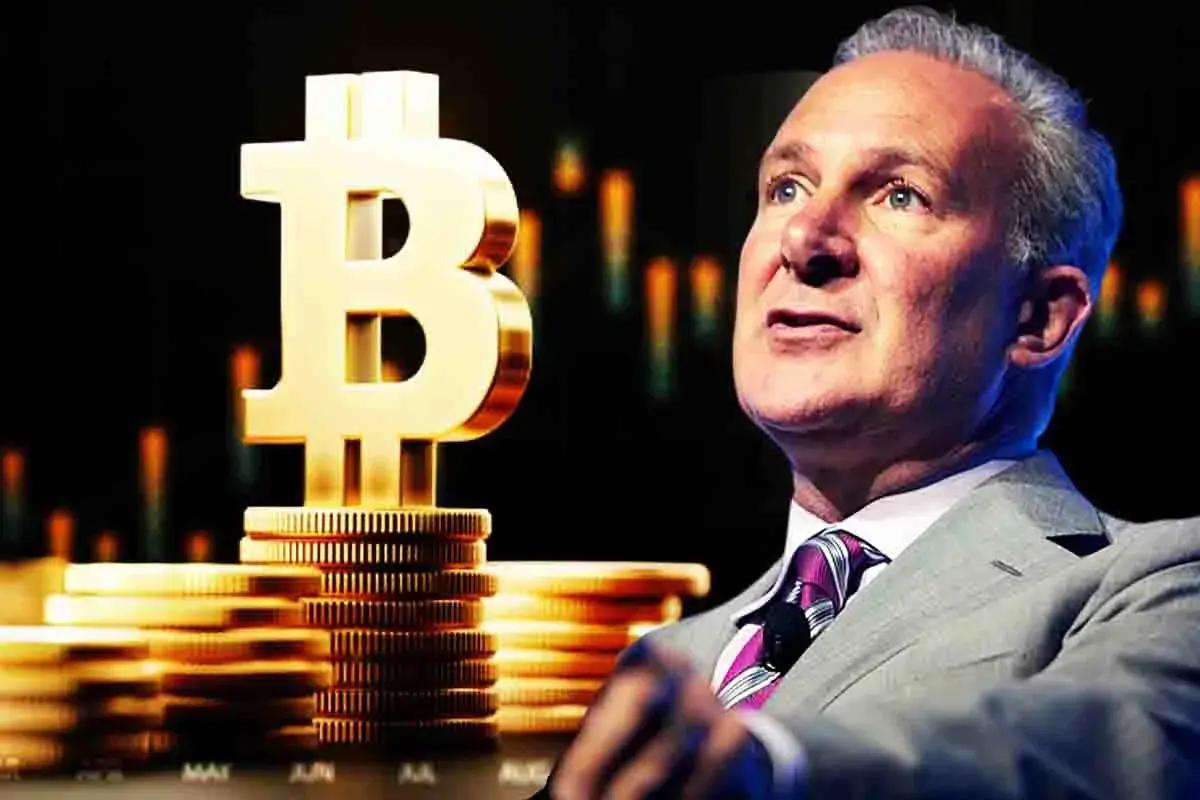Peter Schiff Says Bitcoin Is ‘Anti-Gold,’ Here’s Why

Highlights
- Schiff argues that, unlike gold, Bitcoin is speculative, with traders banking on Trump’s policies rather than using it as a stable value asset.
- Peter Schiff warns that Trump's tax cuts without spending cuts will push deficits past $1 trillion, escalating debt.
- Trump proposed capital gains tax exemption on Bitcoin as BTC price hits an all-time high.
Analyst Peter Schiff, a well-known financial commentator, has reiterated his critical stance on Bitcoin, claiming that it stands in contrast to gold. Amid recent market optimism following the re-election of Donald Trump as U.S. President, BTC has surged, while gold has seen a decline. Schiff argues that this divergence highlights Bitcoin’s speculative nature, positioning it as an “anti-gold” asset.
Peter Schiff Calls Bitcoin “Anti-Gold” as Trump Victory Fuels Rally
In a recent post, Peter Schiff criticized BTC rally, contrasting it with gold’s role as a store of value. Schiff argues that, unlike gold, Bitcoin remains a speculative asset, with traders betting on Trump’s promises rather than viewing it as a stable asset. He warns that these price increases reflect speculation rather than economic fundamentals.
Schiff believes that Bitcoin’s upward trend stems from market enthusiasm surrounding Trump’s victory and his pro-crypto stance. However, Schiff points out that this enthusiasm may not translate into long-term stability.
In addition, Peter Schiff expressed concern over Trump’s economic policies, particularly his tax cuts. He warned that these measures, without spending cuts will increase annual deficits. According to Schiff, with defense, entitlements, and interest expenses untouched, deficits could surpass $1 trillion.
More so, Schiff predicts that this deficit-driven environment will impact the financial markets, especially if the Fed resorts to quantitative easing (QE). This fiscal strategy could push inflation higher, creating additional risks for traditional investments.
The analyst emphasized,
“The best Trump trade now is buying the dip in #gold and gold mining stocks. Cutting taxes is easy. We know from experience that substantive spending cuts are impossible.”
Trump’s Promises Include Capital Gains Tax Exemption for Bitcoin
In his many promises, Trump proposed removing the capital gains tax on Bitcoin, a move aimed at encouraging more Americans to invest in digital assets. This measure has been celebrated among cryptocurrency advocates, who believe it will drive broader adoption.
Peter Schiff, however, views this exemption with skepticism, suggesting it could contribute to unsustainable growth. The analyst also added more criticism stating,
“All of those promises can’t possibly be kept. In trying to keep some, the biggest sacrifice will be soaring debt & #inflation.”
Nonetheless, despite Peter Schiff’s continued criticism, Bitcoin recently reached a new all-time high, crossing $75,000 following Trump’s election win. This rally has boosted optimism among cryptocurrency investors, with many speculating that the incoming administration’s policies may boost digital assets.
Moreover, Senator Cynthia Lummis proposed that the Federal Reserve establish a strategic Bitcoin reserve to bolster the U.S. economy. This plan, part of her “Bitcoin Bill,” sets a goal for the U.S. to acquire up to 5% of Bitcoin’s total supply, with an annual target of 1 million BTC.
- BitMine Keeps Buying Ethereum With New $84M Purchase Despite $8B Paper Losses
- Polymarket Sues Massachusetts Amid Prediction Market Crackdown
- CLARITY Act: Bessent Slams Coinbase CEO, Calls for Compromise in White House Meeting Today
- Crypto Traders Reduce Fed Rate Cut Expectations Even as Expert Calls Fed Chair Nominee Kevin Warsh ‘Dovish’
- Crypto, Banks Clash Over Fed’s Proposed ‘Skinny’ Accounts Ahead of White House Crypto Meeting
- Cardano Price Prediction as Bitcoin Stuggles Around $70k
- Bitcoin Price at Risk of Falling to $60k as Goldman Sachs Issues Major Warning on US Stocks
- Pi Network Price Outlook Ahead of This Week’s 82M Token Unlock: What’s Next for Pi?
- Bitcoin and XRP Price Prediction as China Calls on Banks to Sell US Treasuries
- Ethereum Price Prediction Ahead of Feb 10 White House Stablecoin Meeting
- Cardano Price Prediction as Midnight Token Soars 15%














